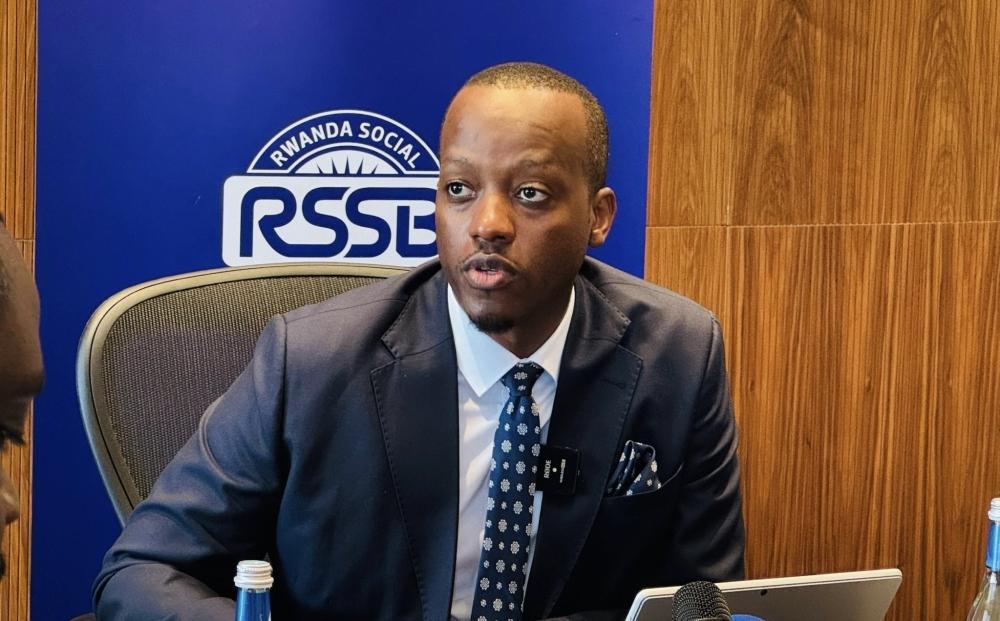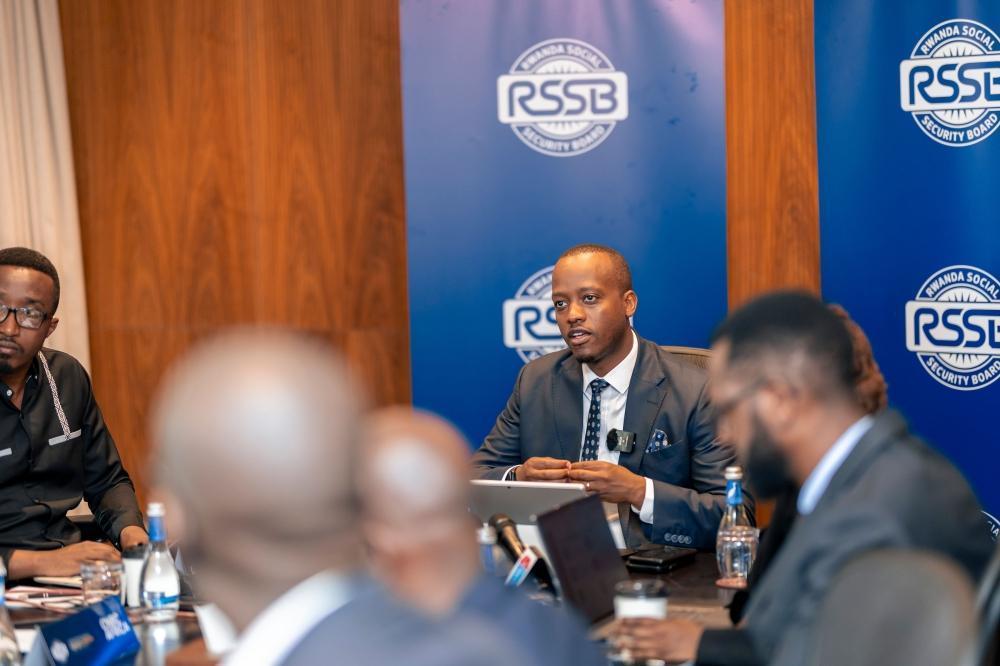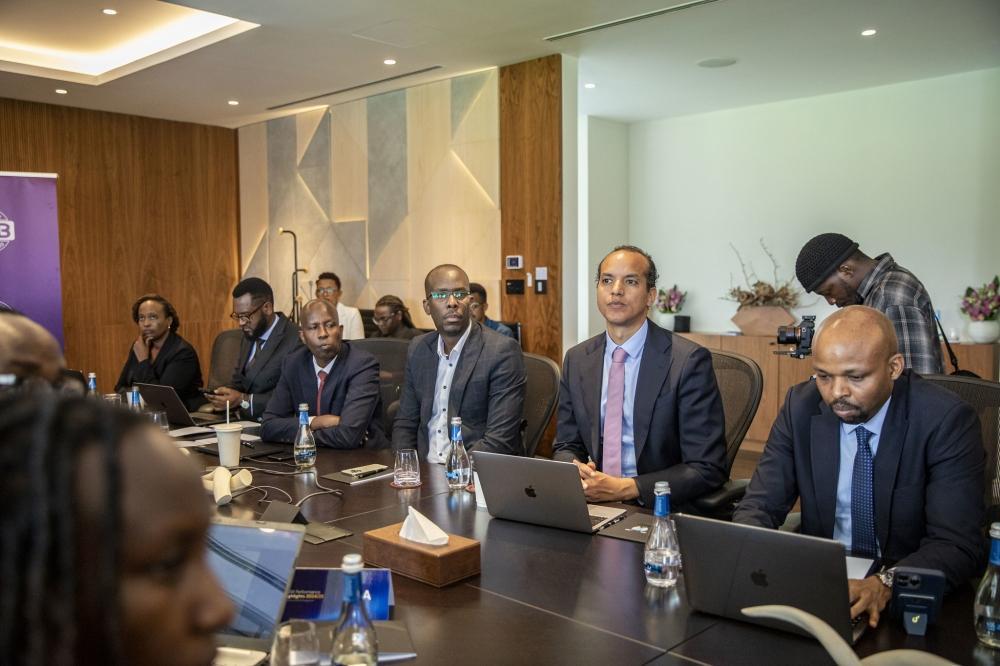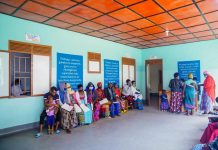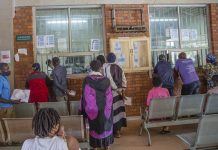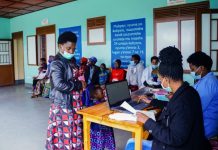Africa-Press – Rwanda. The Rwanda Social Security Board (RSSB) has seen its assets under management double over the past five years, reaching Rwf3.1 trillion in 2025. The institution also posted its highest annual return on investment in recent history, 14.2 per cent—compared to just 1.4 per cent in 2021.
Its investment portfolio reached Rwf2.8 trillion in 2024/2025, growing at an annual rate of 16.7 per cent, and it delivered a net return of Rwf361.7 billion, reinforcing the institution’s financial strength.
RSSB Executive Management shared the data on September 10 as it hosted a media dialogue to share highlights of the body’s performance for the financial year 2024/2025, along with that of the 2021-25 period, which covers its five-year strategy that concluded in June this year.
The CEO revealed that RSSB’s assets doubled over the last five fiscal years, reaching $3.1 trillion in 2025, while the annual return on investment hit a record 14.2 percent, up from an average of 1.4
It indicated that the achieved growth represents a stronger protection for Rwandans across healthcare, retirement, and social welfare.
RSSB CEO Regis Rugemanshuro said “in the last five years, RSSB changed the strategy of how it used to make investments to focus more on long-term fixed income, and making sure that any new investment goes through a strict viability test,” he said.
He stated that the fund’s performance during this period is a clear reassurance to members that RSSB is not operating at a loss. Instead, member contributions are being wisely invested and professionally managed – with the goal of securing members’ welfare and supporting national development.
This, he said, includes expanding benefits under the Community-Based Health Insurance (CBHI), also known as Mutuelle de Santé, by increasing access to critical healthcare services such as heart surgeries, kidney transplants, and certain cancer treatments.
The impact also includes expanding maternity leave benefits for mothers – which features extending the coverage to 14 weeks from 12 weeks.
Investment performance
RSSB’s investment portfolio amounts to Rwf2.8 trillion, indicating significant growth at 16.7 per cent annually and a net return of 361.7 billion.
It indicated that its focus remains on sustaining this momentum amidst an evolving economic landscape.
RSSB Chief Investment Officer, Philippe Watrin, said that the main drivers of the growth include fixed income portion in strategic asset allocation, which represents a more stable performance-generating asset class that provides some consistency in achieving return.
“So, we are able to not only increase the proportion invested into this asset class but as well to invest into longer term and more yielding assets in this category,” he said, citing government securities and rates on fixed term deposits in banks.
Then on the equity portfolio, Watrin said that RSSB was able to turn around some companies such as SONARWA Life (insurance), and to achieve three successful exits – namely its investments in CIMERWA [cement maker], Cogebanque (bank), and Trade and Development Bank (TDB).
“With the profit, we are able to achieve double what we invested which is a tremendous performance from a financial perspective,” he said.
Going forward – over the next five years, Watrin said that the social security institution intends to maintain its strong focus on the fixed income portfolio and continue advancing its equity investments to ensure long-term sustainability. In the real estate sector, he said that the goal is to deliver more projects with timely execution and strong financial returns.
Meanwhile, RSSB indicated that its digitisation initiatives continue to advance with member facing systems fully automated and delivering strong gains in terms of efficiency, financial sustainability and data driven insights.
Tangible benefits for members
The asset growth has translated into tangible benefits for members across all RSSB-managed schemes, especially in healthcare and social protection.
Benefits disbursed to members across schemes reached Rwf223 billion in 2025, reflecting 23 per cent growth compared to the previous year. This enhanced retirement and workplace safety benefits.
Community-Based Health Insurance (CBHI), widely known as Mutuelle de Santé, now covers 88.3 per cent of the population, with expanded services including heart surgeries, kidney transplants, and cancer treatment, which were previously not covered.
Maternity leave benefits were extended from 12 to 14 weeks, enhancing support for working mothers.
Pension and occupational hazards disbursements to members grew by 38 per cent – to Rwf71.1 billion in 2024/25 – compared to the previous year, helping to significantly improve retirement security, according to RSSB.
Pension benefits increments were also supported by the recent reforms that resulted in increasing employee contributions to the scheme.
In August 2025, Dorothée Uwimana, chairperson of the Rwanda Pensioners’ Association, told The New Times that retirees were benefiting from an increase in pension benefits, with those who were receiving the minimum retirement income getting the highest rise.
Figures from RSSB show that the minimum pension a Rwandan retiree gets more than doubled from Rwf13,000 to Rwf33,710 as part of the reform.
“The increase has had a good impact. For many pensioners, especially those who got the minimum, their benefits almost tripled. This was a major change, and pensioners are very happy,” Uwimana said.
Growth in membership and contributions
RSSB has recorded a steady increase in registered members across all the six schemes under its management, with the pension scheme currently having 853,231 members, maternity leave benefits 838,405, medical (RAMA) 768,201, community-based health insurance (CBHI – commonly known as Mutuelle de Santé) more than 11.36 million Rwandans – representing coverage of 88.3 per cent – and EjoHeza long term saving scheme counting more than 3.76 million members.
Mandatory schemes employer enrolment grew by 57 per cent as 2,887 new employers joined in 2024/2025, while new employee enrolment increased by 6.5 per cent, totaling 189,076 additional workers in the same fiscal year.
Another area that saw growth is member contributions across schemes, which reached Rwf515 billion, marking a 34 per cent year-on-year increase – in 2024/25 compared to the 2023/24 performance.
RSSB officials during a press conference on Wednesday, September 10
For More News And Analysis About Rwanda Follow Africa-Press

